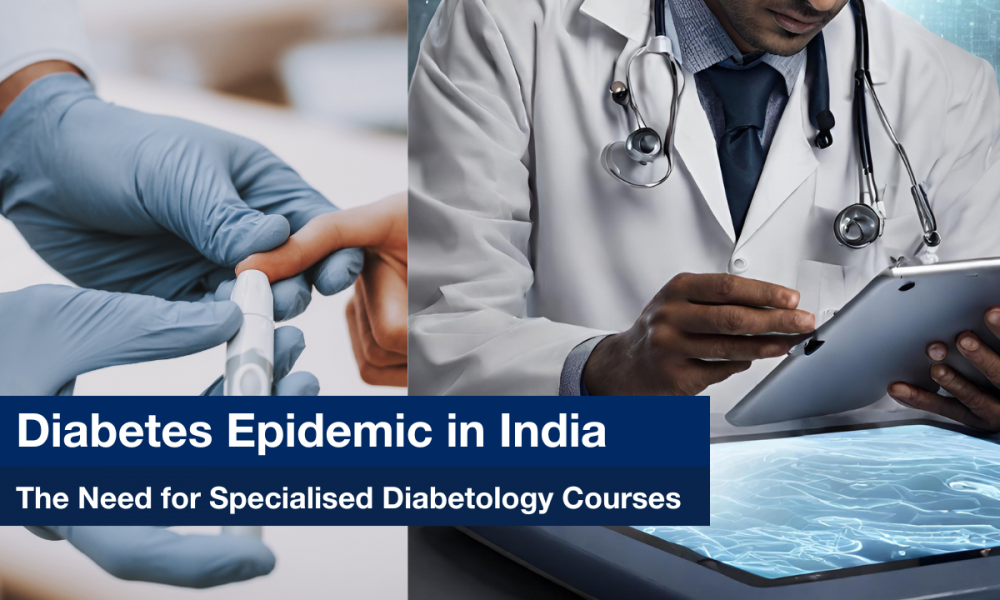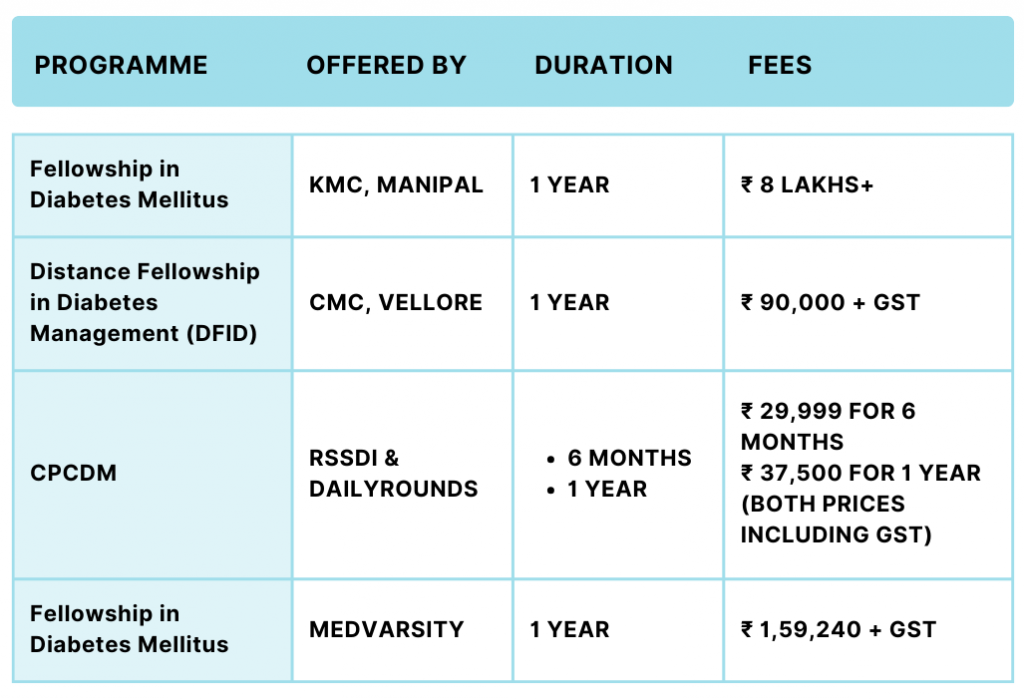
Diabetes Epidemic in India: The Need for Specialised Diabetology Courses
Diabetes is a complex condition involving genetic, lifestyle, and other factors. Proper management goes beyond blood sugar control – including comorbidities and macro and microvascular complications. Complex diabetes cases like diabetic ketoacidosis and diabetic nephropathy necessitate prior training and knowledge of standard guidelines.
According to a recent study by the Indian Council of Medical Research–India Diabetes (ICMR-INDIAB), India now has over 101 million diabetics, a 44% increase in just the last four years. With 15.3% of the population (at least 136 million people) classified as pre-diabetic, this number is projected to rise further in the coming years.
Exploring other options post-MBBS
The number of doctors specialising in diabetes care and management is relatively small. According to a report published in the National Library of Medicine, there are less than 40,000 qualified diabetologists in the country.
Currently, there are around 115 PG seats in Endocrinology, which is not enough to bridge the gap. MBBS doctors interested in diabetology now have the option to explore multiple specialised courses.
The need for specialised Diabetology courses
Additional training on diabetes management and standard guidelines is crucial for doctors across medical specialties to help address this imbalance and mitigate the impact. Given that doctors encounter patients with diabetes across various specialties, staying up-to-date on effective management is vital.
“The incidence of diabetes is increasing very rapidly, and we need to have a large pool of doctors who are trained to treat diabetes. Because all doctors cannot undergo formal training in diabetes, courses like CPCDM, which are taken by the who-is-who of diabetology in India, will be of great use,” says Dr V Mohan, faculty of the Certificate Programme for Clinicians in Diabetes Management (CPCDM), a self-paced online learning programme by RSSDI and DailyRounds.
Overview of Courses in Diabetes Management
Several courses are currently available, with online/on-campus/hybrid formats. The qualification for most upskilling courses is usually MBBS and above doctors. Most fall into two broad categories:
Group Classes
- Often led by certified diabetes educators, nurses, dietitians, or endocrinologists.
- Curriculum may be general or tailored to Type 1, Type 2, or Gestational
- Meet weekly or monthly, in-person or virtually
- Offer opportunities to interact with peers and instructors
- May include guest speakers
Online Courses
- Provide flexibility to complete at your own pace
- Curriculum may be general or tailored to Type 1, Type 2, or Gestational
- Use lessons, quizzes, videos, tracking tools, and downloadable materials.
- Connect you with an instructor or mentor for questions.
- Allow you to revisit materials as needed.
Most practicing physicians choose self-paced online courses, which allow them to balance their existing patient load and upskilling aspirations. One self-paced course is CPCDM, offered by the Research Society for the Study of Diabetes in India (RSSDI) & DailyRounds. Built by India’s leading diabetologists, the course starts with the basics of diabetes, such as the anatomy and physiology of the pancreas, before moving on to the primary management of the disease and management of diabetes complications. This evidence-based approach equips students with clinical cues and practical tips, enhancing their proficiency in clinical practice.
Besides video classes, the doctors are exposed to case discussion videos and interactive webinars where subject-matter experts discuss day-to-day management, comorbidities, and complications. There is a dedicated clinical workshop on diabetic foot, which provides practical experience in approaching patients, diagnosing and managing ulcers, understanding various types of footwear, and offering comprehensive ulcer care. This holistic approach ensures doctors not only grasp theoretical knowledge but also acquire valuable practical skills to enhance their proficiency in diabetes care.
Apart from this, the latest updates in diabetes management, such as innovations in glucose monitoring and insulin delivery and 2024 ADA guidelines on diabetes management algorithms, are also discussed.
“From epidemiology and anatomy of Pancreas to current ongoing research and latest monitoring parameters, this course is the benchmark for diabetes care and management. The detailed videos with case history accompanied by the QBank adequately empower us physicians to tackle everyday practice in a much more comprehensive and holistic manner.” – Dr Ajay Rayudu, General Physician and Diabetologist, Hyderabad.
Such exposure to leading diabetologists gives the theoretical classes a clinical tinge, leading to a well-rounded learning experience.
The Impact of Upskilling in Diabetes Management
Upskilling courses in diabetes have a far-reaching impact – both in the healthcare landscape of the country as well as for the doctors themselves.
With so many diabetics nationwide, upskilled doctors can provide quality care as an accessible first point of contact. This opens new career opportunities to benefit more patients.
For the doctors themselves, it opens up new avenues for career growth and patient care, enabling them to impact more lives. Dr. Lekhraj, a Medical Officer at Bhubaneswar Govt Hospital, says that CPCDM “simplified medication selection and understanding side effects, aiding in effective patient management.”
Dr. Bharat R Kumar from Bangalore says finishing an upskilling course has helped him become more confident in talking to his patients. “As medical graduates, we always need to upgrade ourselves. This course was a very nice avenue to do so. The CPCDM platform provides a series of lectures together, giving us the complete picture. It gave me the confidence to guide my patients better because now I know how to manage the disease.”
Choosing the Right Course
The right specialised course can equip physicians with the latest knowledge and skills to provide optimal, holistic patient care. With many courses available, it is important to make an informed decision. Below is a concise list of some of the courses currently on offer, with costs, duration, and other details.*

When knowledgeable, compassionate physicians have the tools to deliver outstanding, holistic diabetes treatment, it uplifts patients, families, communities, and the nation. By coming together to learn, Indian doctors have the power to lead the fight against diabetes and build a healthier future.